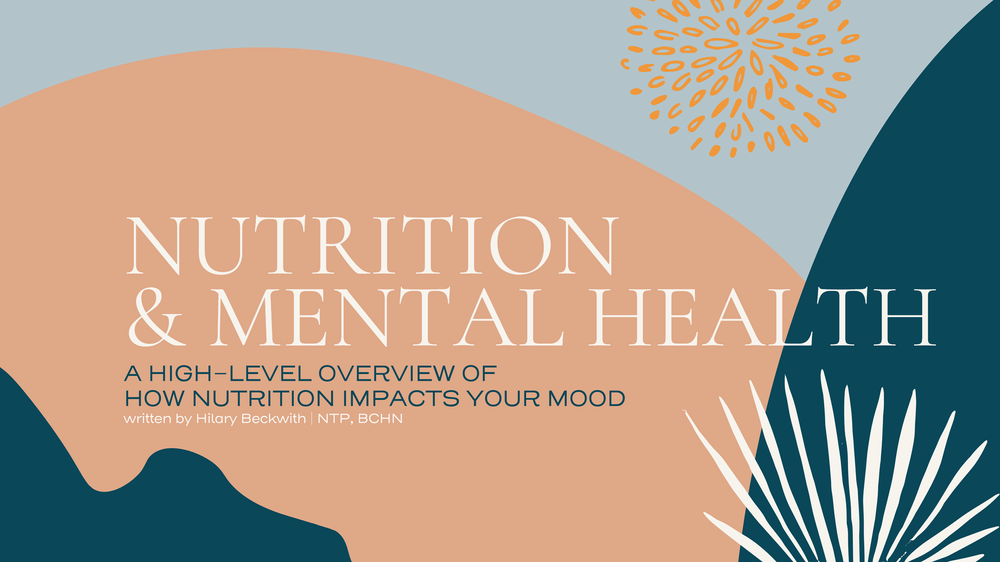Nutrition and Mental Health - How and What You Eat Has a Direct Impact on Depression and Anxiety
The relationship between nutrition and mental health is tied more closely than you may have previously thought. Acknowledging and addressing mental health has been more widely advocated in the past few years (thankfully!), but there has not been much emphasis on the interdependency between nutrition and mental health.
Nutrition and Mental Health
This article was written primary by Hilary Beckwith, in collaboration with Satya Wellness Collective, a mental health clinic in Seattle.
The relationship between nutrition and mental health is tied more closely than you may have previously thought. Acknowledging and addressing mental health has been more widely advocated in the past few years (thankfully!), but there has not been much emphasis on the interdependency between nutrition and mental health.
While it may be generally known that our mental health closely influences the types of food we want to eat, whether we want to eat at all, and how much we eat, what is often overlooked is how food affects our mood and general wellbeing.
Luckily, more and more research is demonstrating that the food we eat has a direct impact on our mental health.
Let’s Take a Closer Look
AMINO ACIDS & MENTAL HEALTH
One of the key components of nutrition and mental health is making sure you are getting the nutrients you need to support healthy neurotransmitter and hormone production, both of which greatly influence mood, anxiety, and food cravings. When you don’t get the nutrients you need, you may experience cravings for foods that are typically stripped of nutrients, perpetuating the cycle of poor nutrition, which negatively impacts mental health.
Let's look at a few examples of nutrients, specifically amino acids, that support optimal mental health:
Amino acids, which are proteins in their smallest forms, are the precursors to many neurotransmitters that impact our mood and mental wellness. The best way to ensure we are getting adequate amino acids is by regularly consuming a wide variety of quality proteins, like eggs, quinoa, nuts, seeds, green leafy vegetables, and properly raised meats, poultry, and fish.
Here are some important amino acids and the role they play in mental health:
Tryptophan is a precursor to serotonin, which helps us feel motivated, satisfied, and prevents worry. You may be low in serotonin if you commonly feel anxious or depressed, or crave afternoon carbohydrates.
Tyrosine is a precursor to catecholamines ((kata-KOHL-uh-meens), such as adrenaline and cortisol, that when released at appropriate times, help us handle stress and to feel awake. Someone who commonly needs coffee to feel awake in the mornings, or craves sweets for an energy fix, may be low on catecholamines.
Glutamine is needed to maintain the health of the digestive tract, and can help reduce sugar cravings, and symptoms associated with poor blood sugar regulation, like irritability, brain fog, and feeling shaky.
GABA, or Gamma-AminoButyric Acid, is known as the "calming" neurotransmitter. It is derived from Glutamine (amino acid) and it is helpful in relieving symptoms of anxiety, stress, and fear.
D-Phenylalanine is a precursor to hormones called endorphins, which are known to reduce pain, help manage stress, and give a sense of well-being. One who struggles with anxiety, chronic pain, or craves food as a reward, may have trouble producing endorphins.
Vitamin B6 & Zinc are not amino acids, as you probably guessed, but they can be highly supportive in regards to nutrition and mental health, as well. People who suffer from social anxiety, are often found to be deficient in these two nutrients.
Practitioner grade forms of these supplements can be purchased directly from my online dispensary. **I do not condone the use of supplements without the supervision of a qualified health professional.
DIGESTION & MENTAL HEALTH
When it comes to nutrition and mental health, how we eat is just as important as what we eat. Your eating habits and atmosphere impacts your digestion of food, assimilation of nutrients, and your emotional relationship with food.
As we learned in previously discussing amino acids, we need to be sure we're consuming a wide variety of quality protein to ensure we are getting the amino acids needed to support neurotransmitter production. Equally important is your digestive ability to properly break down those proteins into amino acids. Mindful eating supports the digestive process, enables you to enjoy food more, and increases awareness of how you feel when you eat. Mindful eating is one of the most effective way to address your nutrition and mental health.
Here are my favorite mindful eating techniques:
Sit down to eat (your car and desk do not count!): When you eat while multitasking (driving, working, cleaning, studying, and even cooking), your body is using its sympathetic nervous response (ie. "fight or flight"), and intentionally inhibits the digestive process. Sitting down with your meal keeps you grounded while you eat, and helps trigger and maintain your parasympathetic nervous response (ie. "rest and digest"). As a bonus, relationships with those who surround you during meals, will improve with your presence.
Deep breaths: This is especially important if your meal is the only calm in a busy day. Before you take your first bite, take five slow, deep breaths, in through your nose, and out through your mouth. This helps your body flip that switch from "fight or flight," to "rest and digest."
Chew your food: This may seem obvious to you, but it's often underestimated. Adequate chewing is not only important to our enjoyment of the food, but it helps us to better know when we are full, and supports the stimulation of adequate stomach acid and digestive enzymes needed to digest your food. There is no magic number of "chews." I recommend chewing until your food becomes liquid. If you feel the need to "wash down" your food, you are not chewing enough.
Minimize beverages with your meals: Liquids, especially low-caloric liquids, like black coffee, water, or tea, will dilute stomach acid and digestive enzymes in your stomach. It's important to minimize fluids like these while eating, to less than 6 ounces, if any.
How Blood Sugar Levels Affect Mental Health
BLOOD SUGAR & MENTAL HEALTH
One last important factor in addressing nutrition and mental health is eating to support blood sugar regulation.
Think of a time when you experienced low blood sugar. How did you feel in that moment? Did you feel irritable? Unwell? Shaky? Tired? Did you lose the ability to focus?
Eating to support blood sugar balance, not only prevents chronic illnesses like diabetes and cardiovascular disease, it also improves mood, and helps us feel more grounded, even when we are hungry.
Poor blood sugar balance often looks like:
High energy after consuming carb-heavy meals or snacks (“sugar high”), followed by a sudden drop in energy about 2-3 hours later
Feeling excessively hungry, or unwell when you don’t eat
Irritability when hungry
Shaky when hungry (this is adrenaline being released in response to stress)
Loss of focus when hungry
Optimal blood sugar balance looks like:
Steady energy throughout the day
Ability to recognize when you’re hungry without feeling shaky, irritable, or unwell
Staying full for longer periods of time
Improved mood and focus
Ability to handle a sweet treat without the consequences of poor blood sugar balance
So, how do you eat to support optimal blood sugar balance?:
Choose whole, or minimally processed foods as much as possible.
Focus on quality proteins, fats, and vegetables. Whole grains, fruits, or starches should be eaten in smaller amounts.
Examples of Quality Proteins: pasture raised poultry and eggs (light and dark meats), grass-fed beef, pork from rooting pigs, cold water wild-caught fish, wild-caught seafood, quinoa, lentils, grass-fed dairy products, nuts, seeds, high protein vegetables (broccoli, asparagus, brussels sprouts, artichokes)
Examples of Quality Fats: Olives, Extra Virgin Olive Oil, Unrefined coconut oil, nuts/seeds/butters, grass-fed full fat dairy, avocados, egg yolks, sardines
Use Mindful Eating techniques, previously discussed
Other techniques to support insulin sensitivity and adrenal response to blood sugar, can include intermittent fasting techniques, and Ayurvedic herbs known to support the HPA axis (Hypothalamus, Pituitary, Adrenal). My favorite product for this is called HPA Adapt, by Integrative Therapeutics (also available through my online dispensary).
It should be noted that intermittent fasting and supplementation should only be done under the direction and care of a qualified practitioner.
Want to know More About Your own Nutrition and Mental Health?
More information about my work with nutrition and mental health, and how I can help you, can be found on my website.
Interested in working with Hilary? Click here to book a free consultation.
Want to share your experience with nutrition and mental health? I would love to hear it (and it may help others looking for answers)! Please share your thoughts in the comments below.
NUTRITION SERVICES
MORE RESOURCES











